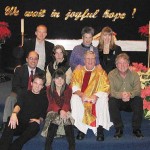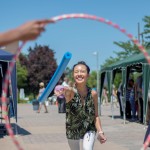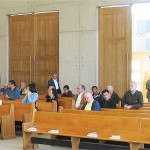WORLD MISSION SUNDAY
October 21st Second Collection
There will be a second collection today for the Evangelization of the Nations, otherwise known as World Mission Sunday. This is a worldwide collection for the missionary church and it is our opportunity to assist at-need Catholic communities globally. Offerings are combined with offerings from other Catholics around the world and distributed to missions and dioceses. We are called to share from our abundance with those less fortunate who lack the basic essentials to know, love and praise our God. Thank you for your support of this important work.
CANADIAN BISHOPS ISSUE DOCUMENT
Protection of minors and vulnerable adults
On October 4th, the bishops of Canada issued new national guidelines for the protection of minors in Canada. Entitled Protecting Minors from Sexual Abuse: A Call to the Catholic Faithful in Canada for Healing, Reconciliation, and Transformation. This document first and foremost, focuses on minors and vulnerable adults, whom Canada’s bishops wish to protect from sexual violence. The document can be found at www.cccb.ca. Since 1989, the Archdiocese of Toronto has had an extensive safe environment policy in place, including a procedure for allegations of abuse or misconduct. That document can be found at https://www.archtoronto.org/about-us/safe-environment.
VOLUNTEER DAY OF REFLECTION
October 27th from 9:00 AM to 12:00 Noon
St. Gabriel’s Church
On Saturday, October 27th from 9.00 AM until 12:00 Noon, an invitation has been extended to our volunteers in all ministries to attend a Day of Reflection, “Leadership through Service” to be held in our church.
Sister Mary Rowell, a member of the Congregation of the Sisters of St. Joseph will lead our session. Sister Mary teaches theology at St. Michael’s College at the University of Toronto.
The day will include presentations, dialogue and engagement of all who attend. We look forward to this day to provide support to our parish staff and parish community. Please RSVP by October 21st to stgabrielsvolscreening@bellnet.ca
PARLIAMENT OF WORLD RELIGIONS
November 1st 2018
St. Gabriel’s Church
The mission of the Parliament of the World’s Religions is to “cultivate harmony among the world’s religious and spiritual communities and foster their engagement with the world and its guiding institutions in order to achieve a just, peaceful and sustainable world.” This year marks the 125th anniversary of the Parliament, which first convened in Chicago in 1893.
The 2018 Parliament will convene November 1st to 7th at The Metro Toronto Convention Centre, and is expected to draw thousands of prominent global religious and civic leaders, scholars, positive social change advocates, and lay members of the world’s diverse religions.
On November 1st, St. Gabriel’s will be host to visitors from the Parliament of World Religions. If you are interested to be part of this event, more information is available at the website https://www.parliamentofreligions.org/parliament/2018-toronto-0
YOUTH GROUP BAKE SALE
Weekend of October 27th and 28th
On Saturday, October 27th and Sunday, October 28th our Youth Group will be having a Halloween bake sale. The money raised will help cover the Youth Group’s transportation costs to World Youth Day in Panama in January. Please support our Youth Group!
ANNOUNCED MASSES
October 22nd to October 27th
MONDAY – LAU KOON TING – Requested by Linda Law & Family
TUESDAY – ANA YAM – Requested by Helen, Ellen & Sonia
WEDNESDAY – ROMULO CHRISTIAN GONZALEZ – Requested by Rosa & Romulo Gonzalez
THURSDAY – ALL SOULS IN PURGATORY – Requested by Teresa Marchie & Family
FRIDAY – DRAGICA PETRANOVIC – Requested by Mira Petranovic
SATURDAY – VICTOR PAUL – Requested by Sophie & Candida Pereira
CONFIRMATION INFORMATION MEETING
Thursday, November 1st at 7:30 PM.
St. Gabriel’s Church
There will be a meeting here at the Church on Thursday, November 1st at 7:30 PM. for parents of children wishing to be confirmed in 2019.
R.C.I.A. AND ADULT FAITH DEVELOPMENT
Meetings in preparation for the R.C.I.A.
(Rites of Christian Initiation of Adults) will begin soon. These meetings are for persons interested in learning more about the Catholic Faith. The exploration may lead the candidate to seek baptism, and become a member of the Catholic Christian community; or for Christians already baptized into another Christian denomination, the reception into the Catholic Church.
Adult Catholics who have not received the sacrament of Confirmation but who wish to do so are also encouraged to attend these sessions.
As well, these meetings may be an opportunity for “Born Catholics” to deepen their understanding of our faith. Very often, especially for those of us who received our religious instruction at an early age, we tend to grow physically, mentally, psychologically etc., but the understanding of our faith does not grow correspondingly. The RCIA may serve as a good opportunity for us to ask questions and to develop a more adult understanding of our faith.
If you are interested in joining the RCIA meetings or if you would like to have more information about it, please contact the Parish Office at 416-221-8866.
SCHOOL AGE CHILDREN PREPARING FOR BAPTISM
If you have, or know of, school age children (ages 7 to 14) who wish to prepare for Baptism, please contact the Parish Office at 416-221-8866. Classes for them will begin soon.
COME AND SEE WEEKEND
Friday, November 2nd at 6:30 PM to Sunday, November 4th at 1:30 PM
St. Augustine’s Seminary:
The Office of Vocations invites single Catholic men 17 years and older, to a Come and See Weekend from Friday, November 2nd to Sunday, November 4th. Participants will cultivate a deeper prayer life and relationship with Jesus Christ; leading to a better discernment of God’s call for their lives. There will be time for prayer, reflection and information on the process of becoming one of Christ’s disciples as a Catholic priest. Registrants 17 years old require parental consent. Register online at www.vocationstoronto.ca.
For more information, please contact Fr. Brando or the Office of Vocations at: 416 968 0997 or email: vocations@archtoronto.org
HUMANITARIAN RELIEF
Areas of the Philippines were devastated by Typhoon Mangkhut on September 15th, with winds of up to 225 km/h. More than 80 people died as a result of the storm and related landslides, flash floods and destruction of homes, infrastructure and crops. The region hardest hit was Northern Luzon, one of the main islands of the Philippines. In this area the storm surged up to six metres high, submerging huge areas of inhabited land.
Days later, on September 28th, an earthquake off the coast of Sulawesi Island, Indonesia, caused a tsunami with waves six meters high. To date, more than 1300 people have been confirmed dead and many, many more remain missing. Survivors are struggling to find food and drinkable water.
People also need adequate shelter and medical support. The earthquake damaged roads and telecommunications systems, creating many challenges to sending assistance to the affected areas.
In an effort to support the survivors of these two significant disasters, the Archdiocese of Toronto is accepting funds that will be sent through Caritas Internationalis, the official relief network of the Vatican. In both countries, Caritas agencies have deployed workers to provide food, drinking water, temporary shelter and medical support.
Those wishing to help may do so in the following ways:
Online through the Archdiocese of Toronto website: www.archtoronto.org
By phone through the Development Office – 416-934-3411
Through the parish, making cheques payable to:
St. Gabriel’s Passionist Parish – 2018 Philippines / Indonesia – Disaster Relief
We offer our prayers for all those impacted by these natural disasters. Thank you for your ongoing efforts to assist those in crisis.
FOOD FOR ROSALIE HALL & GOOD SHEPHERD CENTRE
Each month the food we collect is sent to Rosalie Hall and the Good Shepherd Centre.
Good Shepherd provides hot meals and shelter for the homeless in our city.
Please check the expiry dates before donating since we cannot pass on food that has expired. Thank you for your ongoing support of these important centres.
MOSAIC INTERFAITH ANNUAL PEACE MEAL
Sunday October 21st from 2:30 to 5:00 PM
Temple Har Zion, 7360 Bayview Avenue, Thornhill
MOSAIC Interfaith (of which St. Gabriel’s is a member) invites you to attend the annual Peace Meal on Sunday October 21st from 2.30 to 5:00 PM at Temple Har Zion. The theme will be “Charity and Justice”.
Speakers will be Sarah Dopp, Community Campaigns Manager for Grandmothers to Grandmothers, Jeff Abraham Manager Volunteer Services Habitat for Humanity GTA and Jack Panozzo, member of Steering Committee & Executive ISARC.
This will be followed by the Peace Meal. Attendees are asked to bring a nut-free and alcohol free dish for the vegan supper – ie no meat, poultry, eggs, fish or dairy products. To RSVP please contact Nora at 416-218-0680. For more information see poster on bulletin board.
THEOLOGY ON TAP – THE GIFT OF WATER
From Creation to Commodity
Monday, October 29th from 7:00 to 9:00 PM
The Duke of York Pub, 39 Prince Arthur Dr.
Join Paul Baines from the CSJ’s Federation Blue Communities project to talk about our connection and commitment to water. We will discuss water as a human right, water privatization and commodification, and shared water infrastructure and imagination. Enjoy a drink while we get to the source of our taps and all life on this blue planet.
THE GARDEN SHED
GARDEN CLEANUP BEE
Wednesday, October 24th from 9:30 AM to 12:00 Noon
Please join us for a garden cleanup “bee” on Wednesday, October 24th from 9:30 AM to 12:00 Noon. Your help in putting the garden to bed for the winter would be greatly appreciated whether you stay for all or just a portion of the time. We’ll meet in the Gathering Space.
The next meeting of the Garden Ministry will be on Sunday, October 21st in the Library. Everyone is welcome.
 Founded by St. Paul of the Cross, every Passionist takes a special vow to spend his or her energies in promoting remembrance of the sufferings of Jesus, the memory of the Cross, and reflection of the meaning of the Cross for the world.
Founded by St. Paul of the Cross, every Passionist takes a special vow to spend his or her energies in promoting remembrance of the sufferings of Jesus, the memory of the Cross, and reflection of the meaning of the Cross for the world.




